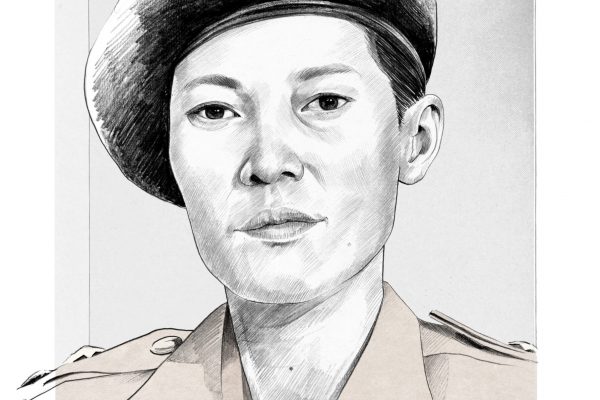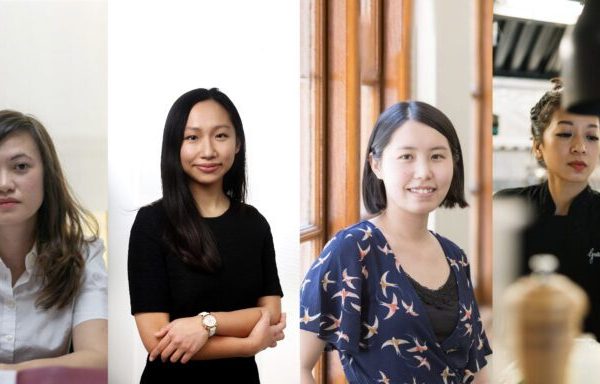The Pitch: Two teenagers share their vision for an anti-harassment platform
Siblings Sophia Chan, 12, and Abraham Chan, 14, share a common vision: To provide a safe, anonymous online space where youth can seek help if they’ve been harassed, bullied or simply need guidance.
With that in mind, they established AMPOWER in 2018. Still under development, the web and mobile platform plans to offer essential resources, socio-economic guidance, career advice, mentorship, and more.
Their mission is an important one. According to a 2017 study by the Hong Kong Jockey Club Centre for Suicide Research and Prevention (CSRP), there were 919 deaths by suicide in Hong Kong in 2016. Of that number, students aged between 15 and 24 accounted for 9.5 per cent. Furthermore, the CSRP found that the number of youth suicide cases within that age group increased by 3.3 per cent from 2014 to 2016, driven by factors such as academic pressure, bullying and mental health issues.
When a user logs on to AMPOWER, a chatbot powered by artificial intelligence will field their questions and concerns, detect and rate their mood, and – depending on the urgency of their situation – direct them to appropriate resources such as government websites, social workers, or healthcare professionals. They plan to build the first iteration in English, followed by multilingual support.
Sophia and Abraham have a vision, but they need to secure funding to fully develop their platform. To help them achieve this goal, we introduced the ambitious teens to mentor Ada Yip. Formerly an executive director at Goldman Sachs, Yip is the CEO of social enterprise Urban Spring and is also the director of WYNG 43 Social Investment, empowering innovators to build meaningful ventures in Hong Kong through investment.
We are sharing the conversation, which has been edited for brevity, as part of Ariana’s mission to inspire collaboration and social progress.
Sophia Chan: Thanks for meeting us! We have faith in our product and want to secure funding. What do we do first?
Ada Yip: I would encourage you to think about funding not just in terms of money. More importantly, you need to think about resources. People are the key to developing a successful product. You might have a million dollars, but unless you have a good team, it won’t be useful. Have you asked some of your friends to look at your website and try it?
SC: Yes! They said it was exciting to ask the chatbot questions and watch it respond.
Abraham Chan: Yeah, they made up scenarios to test the user experience.
AY: How many friends have you asked to try it?
SC: Just our close friends – around 15-20 people from our school.
AY: Okay, that’s good! Which part have you focused most of your efforts on?
AC: Mainly our chatbot and creating the website navigation.
AY: Is the information that you provide on the website compliant with regulations?
AC: Yes, we have done a lot of research and looked at the laws very carefully. Our friends read these sections on our website and said the information was very useful, because some of them didn’t know what help is already available for victims of bullying.
AY: That’s great! The reason I ask so many questions about user feedback is because you need to make sure that you’re providing the public with something they need. Very often, a funder will ask what you have done so far, how you have done it, and what feedback you have received. They need that information to decide whether they want to invest in your product.
AC: What sort of funding do you think suits us the best?
AY: Since you’re both students, and you’re very much in the idea stage, I would recommend you apply for a grant. There are many incubation programmes run by nonprofits that you can have a look at, such as StartmeupHK. These types of services will allow you to raise money and create a better prototype.
There are also donation-based platforms. For example, Fringebacker is a Hong Kong-based crowdfunding platform. Do some research about the number of users, their profiles, your platform’s reliability, and get some more information first. From there, you can develop a more financially sustainable model for AMPOWER.
AC: Are there any challenges with crowdfunding?
AY: Crowdfunding requires a lot of marketing. There are so many projects asking for funding via these platforms that, often, you’d have to spend a lot of time and money in the pre-launch phase to gain more power and traction. If you don’t have a superior knowledge in marketing and social media, it can be quite difficult.
For your project, leverage your position as students and contact individuals who might be interested to support your cause. However, going to the government or a big charity like The Hong Kong Jockey Club will be a bit tricky as you don’t have a proven pilot yet. And you need to be over 18.
AC: Ok great. How much money should we be looking to raise?
AY: I would recommend a small sum to start with. The sum should be based on the scope of phase one. For example, what features are you rolling out? I would recommend no more than HK$50,000 for phase one. Prove the small steps first, and then think about the bigger steps.
AC: What advice would you give us when it comes to pitching potential investors?
AY: Think about what your investors might worry about. Everyone wants their money to be worth something, but that doesn’t necessarily mean a return or a reputation. Consider what their motivation to give you their money might be. It might be someone who wants to support young people and their ideas.
AMPOWER aims to incorporate a chatbot that will provide teens with advice and resources.
SC: Are there any people that you know of?
AY: There will definitely be people to speak with, but first you need to narrow your focus. Then you can contact people within that niche. For example, bullying and sexual harassment. If these are your two core focuses, then you can search organisations that are already supporting these issues.
Alternatively, if you need help technically, perhaps you can reach out to tech companies that will sponsor the development as part of their company’s corporate social responsibility projects.
SC: What skills should we try to develop to make AMPOWER successful?
AY: Well, what do you think?
SC: I wish we had certain skills such as coding or the ability to create a better chatbot, build the website…
AC: Maybe we can take more courses to improve our skills. Our school offers these classes, but not at the level that is required to elevate AMPOWER.
Sophia and Abraham Chan discuss the project with mentor Ada Yip, the CEO of social enterprise Urban Spring and the director of WYNG43 Social Investment.
AY: If you work as a team, I think you can find people to complement your skillset. Other skills I’d recommend would be the three-minute pitch – you need to learn how to clearly articulate your idea. Practice pitching in front of your family and friends. Have you already established a social media platform for your project?
SC: No, not yet. We want to develop our product more before we publicise it.
AY: Okay, but don’t be afraid to do this at an early stage, too. There may be a few like-minded people who share the same vision and want to work on this project with you.
AC: What challenges do you think we will face in the future?
AY: There will be a lot of interest in your idea – it’s well thought out. But you probably won’t get a cheque the first time you meet someone. To demonstrate your plan, you need to have the next five to 10 steps mapped out. This will give funders security, too.
AC: Yes, we expect some rejection, but we are very motivated.
AY: It will take some time, but never be discouraged. Whatever you do in the future, you need to master the three-minute pitch. This will be such great practice, exposure and a valuable learning experience for you.

